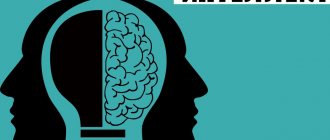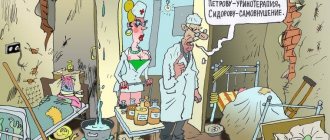Greetings, friends!
Reflection is a special quality inherent in human nature. It is not characteristic of animals and is present only in humans. Thanks to it, we are able to evaluate and rethink our own actions. Unfortunately, reflection often has too strong an impact on our mood. We tend to think about irrelevant events, spending a lot of time and emotional energy on it. In this article we will talk about what reflection is, how it manifests itself, and how to learn to use reflection to your advantage. So,
What is reflection?
In psychology, reflection is the ability of a person to evaluate himself as a unique individual within the society of which he is a part. It includes many aspects, such as awareness of one’s own purpose, assessment of one’s moral and moral qualities, and rethinking of actions.
Philosopher and anthropologist Pierre Teilhard de Chardin said that reflection implies not only the presence of certain knowledge, but also the ability to analyze and evaluate the level of this knowledge. By reflecting, a person tries to look at himself from the outside. He evaluates how adequate, moral and moral his behavior appears to others.
Reflection also implies internal self-knowledge, awareness of one’s own uniqueness, search for purpose, and the desire to determine one’s value to the world. This is an important mechanism for personality formation, determining behavioral patterns. It affects perception, reaction to surrounding events, decision-making and other individual aspects of human behavior.
How does reflection manifest itself?
Reflection helps a person understand how he looks from the outside, therefore it is one of the most important mechanisms of personal development . Under its influence, a person engages in self-analysis, forms desired habits, and learns to better understand the connection between his actions and the events that follow them. This ensures the development of one of the most important components of our intelligence - the ability to foresee the consequences of our own actions.
Influencing our perception, reflection performs such functions as:
- getting rid of destructive and simply unwanted thoughts;
- formation of logical thinking;
- improved control over one’s own thoughts and actions;
- understanding your own advantages and disadvantages;
- development of self-criticism;
- developing the ability to see the relationship between actions and consequences;
- planning training;
- finding solutions to complex problems;
- finding hidden talents and abilities.
All of the above points are positive, but reflection is not always beneficial. Excessive thinking about one’s own mistakes causes a person to waste a lot of emotional energy, and this is not the worst consequence of self-examination. Therefore, it is important to learn to reflect moderately and consciously, without causing damage to your own psyche.
Why is reflection needed?
Trying to define what reflection is, scientists came to the conclusion that its most important function is self-knowledge. By contacting the outside world, observing people’s reactions to their own actions and comparing their behavior with his own, a person forms a set of requirements for himself - a kind of set of rules that he strives to adhere to.
Reflection is necessary in order to accumulate life experience and respond to external events not affectively, but in a balanced and deliberate manner. A person constantly monitors his mood and well-being, tracking the emergence of certain emotions in time, dealing with them and consciously selecting the most adequate response option.
In some situations, a person has to turn to a psychotherapist to understand how he developed certain feelings. A developed ability to reflect makes it possible to understand such things independently. It significantly improves understanding of cause-and-effect relationships and time dependencies. For most people, this understanding is determined by emotions, so quite often it turns out to be wrong.
A person with a developed ability to reflect can draw knowledge from all events that occur. He learns to better understand his own inner world, discovers new features of his character, discovers hidden talents, abilities and predispositions.
But sometimes self-analysis can cause sharp negative emotions. If a person perceives his own mistakes too painfully, reflection can provoke the development of complexes and other problems with his mental state. In this case, it is recommended to consult a psychotherapist who will help you take control of reflection and get rid of its negative manifestations.
Interesting test
To confirm that a person has the ability to direct thoughts to someone else’s consciousness, we will present one of the well-known tests.
Three test takers are shown the details: 3 black and 2 white caps. Then they put blindfolds and black caps on them. At the same time, they report that any of them can wear either a black or a white cap on their head.
Then the bandages are removed, and the test takers are given the following task:
- Raise your hand if you see at least one black cap;
- Leave the room if you guess which cap you are wearing.
As a result, everyone immediately raises their hand, but then there is a delay. Eventually, someone leaves the room.
This is where reflection regarding someone else’s thinking manifests itself: “Am I wearing a white cap?”, “No, if he were white, then one of the other two participants would see that the third was stretching out his hand, since he sees the black cap only on himself. But then he would go out, but he sits. So I’m wearing a black cap!”
The unique ability to reason for two other participants at once helped them guess the color of the cap. The one who came out first has more developed reflexivity than others.
Forms and types of reflection
As we have already found out, reflection is a complex process that can lead to both development and destruction of personality. To better understand why this happens, let's consider the main forms of reflection that psychology identifies. There are several approaches to classification.
Based on the type of influence on a person, there are two types of reflection:
- Constructive self-reflection
. This form of reflection helps to better understand your own inner world, adjust behavior, avoid repeating mistakes and discover new abilities in yourself. - Destructive self-analysis
. This form of reflection is often called “soul-searching,” meaning meaningless worries about old mistakes. A person becomes fixated on the problem, constantly increasing his feelings of guilt, feeling helpless and hopeless.
Based on the time of the events being comprehended, there are 3 types of reflection:
- Situational
. Analysis of a problem that is relevant at the moment. - Retrospective
. Understanding events from the past. - Promising
. Planning actions, assessing the likelihood of success and predicting possible mistakes.
Depending on the object being comprehended, there are 4 types of reflection:
- Self-reflection
. Understanding your own inner world, experiences and emotions. - Communicative
. Analysis of interaction with surrounding people. - Sanogenic
. Understanding your own emotions in order to take control of them in order to minimize meaningless mental suffering. - Intelligent
. Thinking about existing and necessary knowledge, searching for opportunities for its practical application.
Having a good understanding of what reflection is and how it works, you can learn to manage its various forms. Correct combination and combination of these forms allows you to achieve the best results in self-knowledge. It is important to consider that different combinations need to be used for different situations.
Reflection in psychology is the basis of self-analysis
In psychology, this is one of the basic concepts on which self-analysis is built, leading to expanded awareness. A simple example: if I am not able to understand that my mood is always bad for the reason that I always think about bad things, then it is unlikely that anyone or anything will help me get out of my own suffering.
Reflexive action consists of a volitional decision to stop the endless flow of automatic thoughts and begin to become aware of oneself in the moment here and now.
To reflect means to think, analyze, and engage in self-knowledge. Correct self-analysis will help you avoid making mistakes in the future and provides answers to many important questions, both psychological and everyday.
As a result, the individual (who is this?) learns to think rationally (reflect correctly), not guided by fantasies and guesses, and also:
- control and analyze mental flow;
- evaluate your own thinking;
- frees oneself from unnecessary, destructive thought forms;
- gains the ability to make informed choices;
- reveals his hidden abilities and resources.
A person with a low level of reflection commits the same erroneous actions every day and suffers from this.
On the other hand, the term “reflect” is often applied to people who are acutely experiencing something, begin to engage in soul-searching, worry, and get nervous (breaking their fingers).
Let's say he was told that everyone around him is an idiot and he begins to try it on, not himself, gets offended, becomes constrained, reflects, i.e. looking for the bad in himself. This is an extreme that should be avoided. In everything (and especially in self-examination) moderation is needed.
If you want to change yourself and your life, but at the same time you live “automatically,” then this is the path to disappointment and suffering. You need to learn to reflect correctly (without fanaticism and humiliation, soberly, objectively).
Constructive reflection is useful. This is when you draw the right conclusions from your self-analysis and use this knowledge in the future so as not to step on the same rake.
Destructive reflection is extremely harmful. Focusing on the problem, on your wrong (from your point of view) behavior does not help you, but on the contrary, exhausts you. You begin to feel guilty and cannot get rid of this feeling. Sometimes only Gestalt therapy helps to get out of this state.
By the way, it is the bourgeoisie who want to force us to reflect, plunging our faces into the dark spots of our history (Stalinism, repressions). It is precisely the formation of feelings of guilt that they want to achieve. Everyone has dark spots, but it is beneficial that only we, and not the residents of their countries, focus on this.
How to use reflection to your advantage?
Any skill develops effectively only with regular use. To develop reflection, you need to practice it regularly. There are several exercises that will allow you to do this as consciously as possible:
1. Be aware of current feelings
. This is a useful habit that should be applied whenever there is a change in environment. Did you feel that your emotional state had changed? Listen to your feelings, try to understand what you feel at the moment, what worries you. Quite often, non-obvious things are discovered.
2. Highlight the situations to which you react most painfully
. Understanding which events trigger strong emotional reactions can help you identify problem areas and target them.
3. Learn to intentionally stop self-searching
. In most cases, self-digging does not bring any benefit, but only worsens your mood and reduces productivity. Fortunately, this process can be controlled intentionally. Just tell yourself that you will think about it later, but now you need to get busy.
4. Don't try to control everything
. It is impossible to control everything; some things are truly better left to chance. Allow surprises to happen from time to time, and focus on controlling the most important aspects of life.
5. In the evenings, reflect on your day
. This is a healthy habit that many successful people practice. Just think about what made this day remarkable, what useful things were done and what mistakes were made.
6. Think in detail about everything that interests you
. Choose any subject that interests you and think about its nature. Thanks to interest, this process will be uncomplicated and enjoyable, while you will develop deep analysis skills.
Concept of self-reflection
Self-reflection is often identified with reflection. This is partly true. The difference between the concepts is that the prefix “self” indicates a reflection of oneself, and not just the external world, events and other people.
Self-reflective people constantly listen to their own feelings and emotions and try to analyze them. Such exercises are very useful for understanding your own self, personal desires and needs. How often do we focus on the expectations of other people, looking for an assessment of our actions from the outside. As a result, one’s own dreams and internal needs remain unfulfilled.
Young people enter training in prestigious professions, and their souls are drawn to creative delights. As a result, the profession does not bring satisfaction, but the parents are happy! A person lives an uninteresting life, suppressing existing talents.
There is another side. In hypertrophied cases, a person constantly listens to emotions. He becomes fixated on personal experiences and becomes neurotic, not seeing the outside world, which is beautiful. A person stops enjoying life, constantly analyzing his own condition.
In this case, it is important to get out of yourself in time, take a deep breath, feel material things: table, floor, wall, hands, feet, sounds and smells.
Many people are wary of their own body signals. Often, excessive reflection leads to neurotic diseases, for example, hypochondria (a pathological condition in which we find ourselves with all possible and impossible diseases).
Cases have been recorded when women find all the signs of pregnancy, and only the results of repeated laboratory examinations (for example, ultrasound) can dissuade them from this. Of course, if you suspect a disease, you must undergo a medical examination. But when a person realizes that his fears are far-fetched, he should move away from focusing on personal feelings and ignore them.











